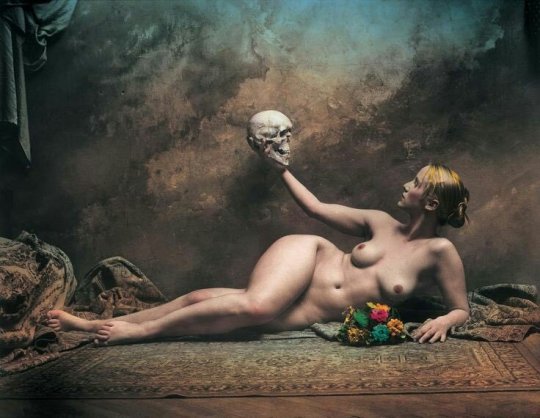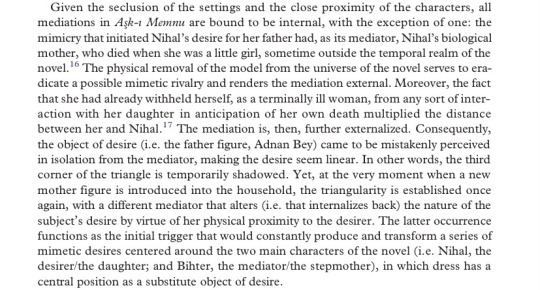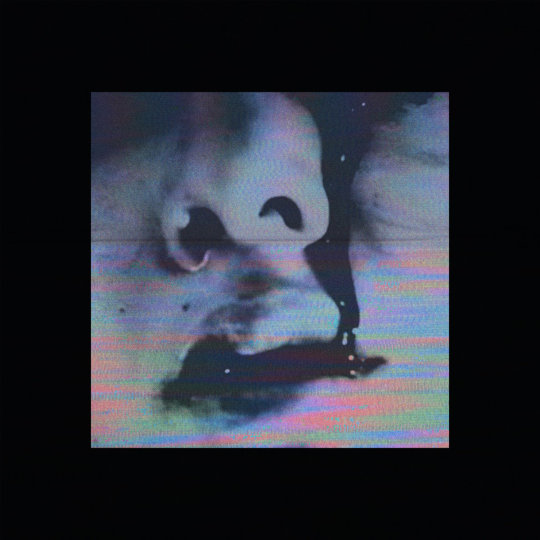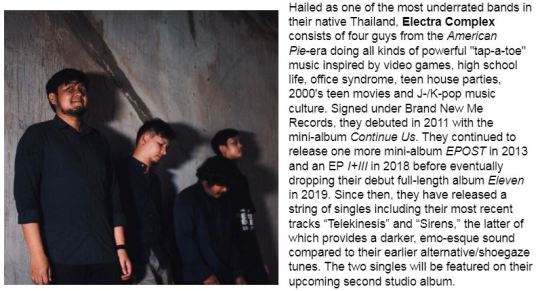#electra complex
Text

The Slavic Girl with Her Father by Jan Saudek, 1998
2K notes
·
View notes
Text
The Electra Complex was theorized as a secondary pallet-swap to the Oedipus Complex, and Electra just wanted to avenge her (*ahem* rightfully murdered) father; she never wanted to marry him. Therefore, it should be renamed after a girl who really wants to kill her mother and marry her father. Here I propose the Chibiusa Complex. In this essay I will—
22 notes
·
View notes
Text
Speaking of Girardian mediation:

@literatureismyentirepersonality @amourduloup
Tbh as a “Nihal’s Elektra Complex” truther, I am not sure that I agree that the image of her mother serves as a model for her love for her father. We never get anything about Nihal’s knowledge of her parents’ relationship if I am not forgetting something. But then, I do think that Nihal’s sicknesses might be a psychosomatic imitation of her mother’s real physical illnesses.
18 notes
·
View notes
Text
due to my father i’m evil now
#deadbeat dad#dysfunctional family#oedipus complex#electra complex#daddy issues#mommy issues#revenge#narcissistic dad#toxic people#toxic household#toxic parents#toxic father#abusive stepfather#abusive father#psycho
11 notes
·
View notes
Text

7 notes
·
View notes
Text

sobbed over this
#the unabridged journals of sylvia plath#sylvia plath#mommy issues#daddy issues#electra complex#girlblogging#plath quotes
5 notes
·
View notes
Text
¿you guys ever think that maybe freud just knew a lot of tboys?
#penis envy MY ASS#okay out of context that sounds wrong#just to be perfectly clear THIS IS A JOKE#freud#sigmund freud#trans#transgender#transmasc#psychology#electra complex#more like#that’s enough nicotine and cocaine for you mister “every dream is a repressed metaphor for sex somehow”
3 notes
·
View notes
Text
Oedipus complex as a term for a guy who's attracted to his mother sucks for Oedipus cause he did NOT wanna marry his mum but let's talk about how much worse Electra complex is because her father died years before and she's trying to avenge him? She didn't touch that man?
Imagine if someone murdered your cousin and you took them to court and ppl accused you of secretly wanting to fuck 💀
#electra complex#like??? why tho#me: gets murdered#the State: pursues my killers#me: twirls my hair with my boney skeleton fingers and bats my eyelashes#if anything we should be calling it a myrrha complex
3 notes
·
View notes
Text
Ladies Im starting to uuuh. think Freud had a point
3 notes
·
View notes
Text
Plath's "Daddy" and the Electra complex (p2)
...
Applying the Fruedian lens to the poem Daddy sheds new light on the relationship between the speaker/plath and her father in terms of how the progress of the Electra Complex challenges a woman to adapt to the traditional female gender role. The Freudian lens creates a wider context and aids us to further understand the psychological side of the poem-- and the connection between women's role and society.
According to Doctor Cherry’s article, if the Electra complex is not resolved in early childhood, the child is likely to seek out partners who remind them of their father figure. In Plath’s case, her father’s death stayed a mystery to her, which she spent the rest of her life looking for an identity and a companion who resembled her father. In the poem, the speaker states that she knows what she should do to resolve the nagging pain of losing her father: “I made a model of you, a man in black with a meinkampf look.” The man in question is the speaker’s husband, someone with the look of a German man with moustache - the word“meinkampf” is a direct hint at Hitler, which correspondes with her previous description of her father’s appearance: a German, a Nazi, a facist. The speaker is casting a near delusional control over herself, a masculine power that resembles the oppression her father brought to her with his sudden and unexplained death during her childhood. Doctor Cherry called the need for control a fixation caused by the Electra complex. “A fixation is a persistent focus on an earlier psychosexual stage. Such fixations, Freud believed, often led to anxiety and played a role in neurosis and maladaptive behaviours in adulthood.” The fixation the speaker created is a sense of masculine control she needs to sustain herself. It is rooted from her father’s absence in her early childhood. The electra complex within the speaker was not resolved because she could “never speak to him”, which led her to have a long lasting urge and anxiety in wanting to be controlled throughout her womanhood, she longed for a sense of security that she could not get from her father. We can see that there is comfort provided from the security created by masculine power and control.
The speaker of the poem fits perfectly in the description of a woman who is affected by her unresolved feelings towards her father, which as a solution she then shifted the fixation onto her partner. “The vampire who said he was you, and drank my blood for a year, seven years, if you want to know.” This line is again, directly addressed at her deceased father, however about her husband, another figure who feeds on her blood and tears her down. The metaphor of comparing the male figures in her life to vampires and Nazi indicates a similiarity in the imbalance of power in her relationships with men. The woman is a vulnerable, fragile victim who lives in the shadow of violent, blood sucking predators. The sense of comfort in security and control from males also happens to be destructive. The father and the husband are copies of one another, the same appearance, the same destructiveness towards the female. However, it is clear the speaker chose to create a model of her father: she demands a sense of unhealthy patriarchal control to sustain herself, the Electra complex has infiltrated her values and desires. To support this theory, a quote from the critical theory book Through the Literary Looking Glass (written by Sian Evans) stated: “So that to both genders it is the opposite sex parents who is largely responsbile for healthy sexaul and psychological development in a child.” The speaker’s unhealthy subconsciousness in seeking a partner is majorly influenced by the absence of her father and a lack of communication, let alone her conflicted feelings towards her father, which reinforces the theme of the poem: love, hatred and loss. The need for unhealthy masculine control can be understood as a failure in the developmental stage of a young woman’s sexual psychology. The Freudian lens of the electra complex is a prominent psychological aspect to the poem Daddy as it explains the reasoning behind a woman’s troublesome relationship with males in her life. It explains how the electra complex influences a woman’s subconscious desire to seek for a partner who displays similarities with her father figure. We can see that the speaker of the poem, and Plath herself fit into the diagnosis of the Electra complex, who was greatly affected by the disastrous outcome of it in her adulthood.
The poem explores the relationship between a daughter and her unresolved attachment to her father as she grew old and cynical. The psychological theory of the Electra complex has been a commonly used theme in association with femininity and adolescence in the literature field: in poetry, literature and films. From Sylvia Plath’s “Daddy”, one of the most prominent literature works which explored the theme of the Electra complex, to Dolore’s confusion and her emerging electra complex after her mother’s death(from Humbert Humber’s unreliable narration). Women are constantly placed as the subject of desiring a fatherly figure who could give them a sense of comfort and love which they barely received from their own father, the modern approach to this could be interpreted as “daddy issues''. It is certainly another societal construct to put women down. Here is another quote that criticises the idea of the Electra complex from Looking Through the Literary Looking Glass: ““Upon widespread objection that the initial theory was too gender-biased, Freud adapted it to a far less satisfactory female version.” We can see that the idea of the Electra complex and daddy issues are indeed sexist from a modern approach: how is it reasonable to justify a woman’s depression and desires for security by the strained relationship with her father? The ideas of Daddy issues and the Electra Complex are outdated and misogynistic in many ways: it is the impact of toxic masculinity that fluctuates a woman’s behaviour and values in adulthood. Not to mention, their desires for masculine control and comfort are often results of their insecurities and frustrations that were embedded in their childhood due to an irresponsible father or an absence of paternal protection and love. Freud’s Electra complex theory, as previously mentioned, is widely associated with women's sexuality and morality. As an extension to Freud’s sexist theory, commonly used phrases nowadays like “fatherless behaviour” and such are highly problematic. These concepts sexualise and objectify women who as children had complicated relationships with their dads, and associate their childhood traumas and unfortunate experiences with promiscuity and lack of self respect. We should acknowledge that everyone has different responses to negative influences in their childhood: some may develop significant growth while others may suffer from long-lasting consequences. Framing the electra complex and daddy issues as negative feminine traits is horrible and unfair.
Applying the Freudian lens of the Electra Complex to the poem Daddy conceptualised the complicated relationship between womanhood and fatherhood. It enriched my understanding in the feminine longing for a masculine control: the psychoanalytic lens of the Electra complex unveils the depth to the frustration, confusion and depression behind Plath’s life and literature through analysing the psychology of a young girl and the reasons behind her emotional baggage in adulthood. Ultimately, the theory of the Electra complex is a paradox which positions the woman as the victim, however associating the outcome of her trauma with negativity. Critically speaking, I believe applying the Electra complex lens to the poem elucidates the psychological aspect of the father-daughter relationship, but it is not a valid theory to justify the toxic masculinity behind the female oppression.
9 notes
·
View notes
Text
the real separation that needs to happen is the separation of mommy/daddy issues from freudian ideologies
15 notes
·
View notes
Note
also the greek myth of Myrrha really interests me. why is it called the "Electra complex" when Myrrha complex makes more sense? Electra didn't even sleep with her dad smh
I have often wondered this too. Calling it a Myrrha complex makes a lot more sense. Though Electra is such a cool name, it really gives it some oomph.
11 notes
·
View notes
Text
All my homies hate Freud
#he’s so fucking weird#it’s like he walked into his friends’ room and was like#you know when you want to fuck your mom#and his friends were like#wtf sig#and he had to really quickly cover his ass#welcome to my mind#freudian#tw freud#Freud#sigmund freud#oedipus#oedipus complex#Electra complex
2 notes
·
View notes
Text
8 notes
·
View notes
Text
As bad as their relationship was, I can only imagine the love Norman possessed for his late mother Norma. (And I'm not talking "Soulbates" Ew). I'm talking about the undying familial love between a mother and her child, even from beyond the grave.
#psycho 1960#alfred hitchcock’s psycho#norman bates#norma bates#dysfunctional family#love#mother and child#family#oedipus complex#electra complex#revenge#daddy issues#abusive stepfather#abusive father#deadbeat dad#absent father#personal#rants
4 notes
·
View notes
Text
ROCK THE WORLD: ELECTRA COMPLEX


Hometown: Khon Kaen, Thailand
Latest Release: “Sirens”
Check out ELECTRA COMPLEX on their social media accounts here:
Facebook / Twitter / Instagram
Check into @sagehaleyofficial’s “Rock the World” every Wednesday!
#sage haley#rock the world#electra complex#alternative#rock#shoegaze#emo#khon kaen#thailand#asian pop punk#music#music blog#blog#music review#band of the week
2 notes
·
View notes